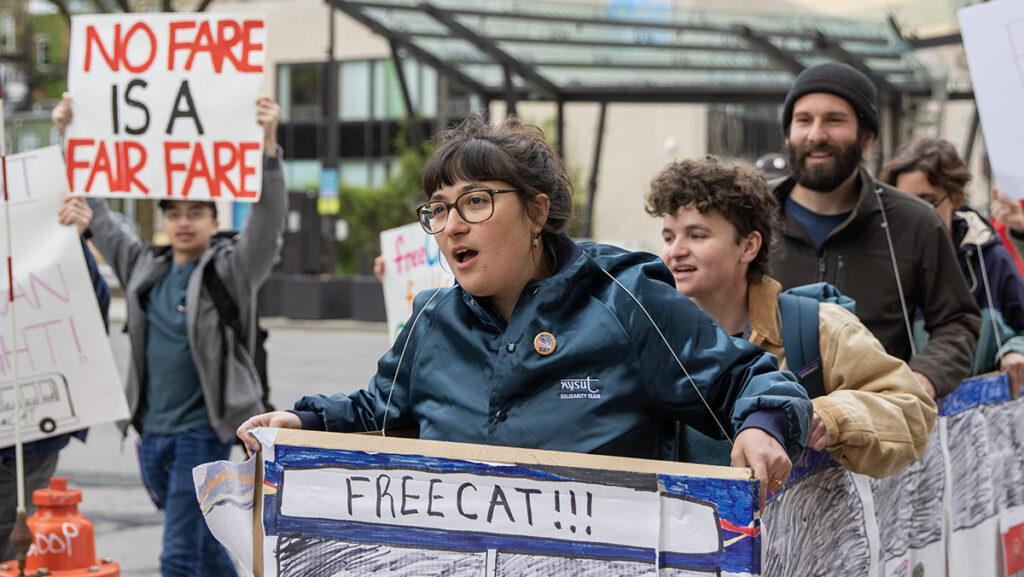The Ithaca Democratic Socialists of America and the Ithaca Sunrise Movement held a rally on The Commons on May 2 in support of the FreeCAT movement, which aims to remove ride fares from Tompkins Consolidated Area Transit bus services.
The FreeCAT movement began in March 2022 with an online petition posted on the DSA Instagram page. As of May 3, the petition has received 536 signatures. In the FreeCAT vision statement, proponents said that eliminating TCAT fares will increase the standard of living and decrease the number of private vehicles on the road, which would reduce the city’s carbon footprint.
At the rally, about 20 demonstrators carrying signs and flags gathered in support of the movement. The protest attracted a handful of onlookers, including local politicians Daniel Klein, Tompkins County District 7 legislator; Mike Sigler, Tompkins County District 6 legislator; and 4th Ward Alderperson Jorge Defendini on the Ithaca Common Council, in attendance.
In 2019, the City of Ithaca adopted Ithaca’s Green New Deal, with goals of reducing carbon emissions and achieving community-wide carbon neutrality by 2030. In recent years, concern has mounted over the seemingly stalled progress on the resolution, especially following former Mayor Svante Myrick’s departure.
In response to the petition, TCAT tasked its Planning Committee with determining if going fare-free was possible. In its report, the committee concluded that going fare-free is fiscally and operationally impossible at the time.
Scot Vanderpool, general manager of TCAT, however, outlined steps he said could allow for the elimination of fares, including increasing TCAT’s driver count to at least 90, hiring at least two additional mechanics and finding more available vehicle parts. As of February 2022, TCAT had 80 drivers, according to The Ithaca Voice.
Sabrina Leddy, chair of the FreeCAT movement, spoke at the rally, demanding greater contributions to TCAT from Cornell University and refuting the TCAT Board’s statements that going fare-free is impossible.
“The TCAT board released yet another statement asserting their refusal to go fare-free because there are too many financial roadblocks,” Leddy said. “Every time they do this, they go to great lengths to detail those roadblocks and they make no mention of Cornell and its ability to [cover] those concerns with a fraction of a percent of the university’s billions of wealth.”
Klein, who served on the TCAT board for seven years and is an author of the TCAT report, said TCAT does not currently have the resources to overcome the financial and logistical difficulties of going fare-free.
“I know they’re suggesting people are using that as obstructionism,” Klein said. “I understand why they’re saying that. But [TCAT] simply does not have enough drivers and mechanics to do more because research suggests that if you go free, then you immediately increase the number of riders by 20%.”
Activists point to Cornell University as the solution to TCAT’s financial problems. On Jan. 20, Cornell agreed to increase its funding to TCAT as one of three underwriters. While TCAT originally requested an 8% increase from all of its underwriters, Cornell negotiated to increase by 5%, meaning the other two underwriters — the City of Ithaca and Tompkins County — also could only increase funding by 5%, despite already agreeing to the 8% increase.
Klein said that in order to go fare-free, the underwriting funding grant which makes up a portion of TCAT’s $19 million budget — which currently stands at approximately $3 million according to The Ithaca Times — would have to increase by $2–3 million.
Jane Glaubman, a member of the DSA, said in a speech that Cornell has a history of benefiting from public services, like through the Morrill Land Grant Act.
“I would like [the crowd] to say, ‘Cornell owes us everything,’” Glaubman said.
The Morrill Land Grant Act was chartered in 1862 and provided the university with nearly 1 million acres of land. Land that was sold in the early 1900s to increase the school’s endowment to $5 million is equivalent to $150 million today.
Annika Rowland, a Cornell graduate student and member of the DSA, said recent TCAT reports do not take into account if Cornell provided greater tax contributions to the county.
“If [the reports] were redone to consider Cornell paying what they should be paying based on their ridership, the report would look very different,” Rowland said.
Cornell University has approximately $2.1 billion in assessed value of tax-exempt property, contributing $1.3 million per year to the city, of which $802,000 is for fire services, according to The Ithaca Voice. The university’s contributions are dictated under a Memorium of Understanding agreement, which is in place until next year, something activists say the county must take advantage of.
Following the speeches, demonstrators marched from The Commons to the Tompkins County Legislative Chambers, chanting “FreeCAT,” carrying signs demanding action, including “Free and Expanded TCAT for all,” “FreeCAT for the Climate,” and “No Fare is a Fair Fare.” Demonstrators also sang a variation of “The Wheels On The Bus,” with modified lyrics in support of no fares. A copy of the petition was placed on each of the legislators’ desks.
The legislative chambers were full of demonstrators, other members of the public and the legislators themselves. Eric Nord, Glaubman and other Ithaca residents spoke in support of the FreeCAT movement.
“I’m here to remind you that the FreeCAT campaign is a rare opportunity to stand up to a dominant private interest to provide critical resources for the community,” Nord said.
At the meeting, Leddy called on the legislators to look out for the Ithaca community.
“Please be brave,” Leddy said. “As Cornell’s fall-fare payment to TCAT is negotiated by some members of this body [and], as its tax-exempt status and how much its paying [are] brought into question in the coming year, be brave — please stand with us.”








